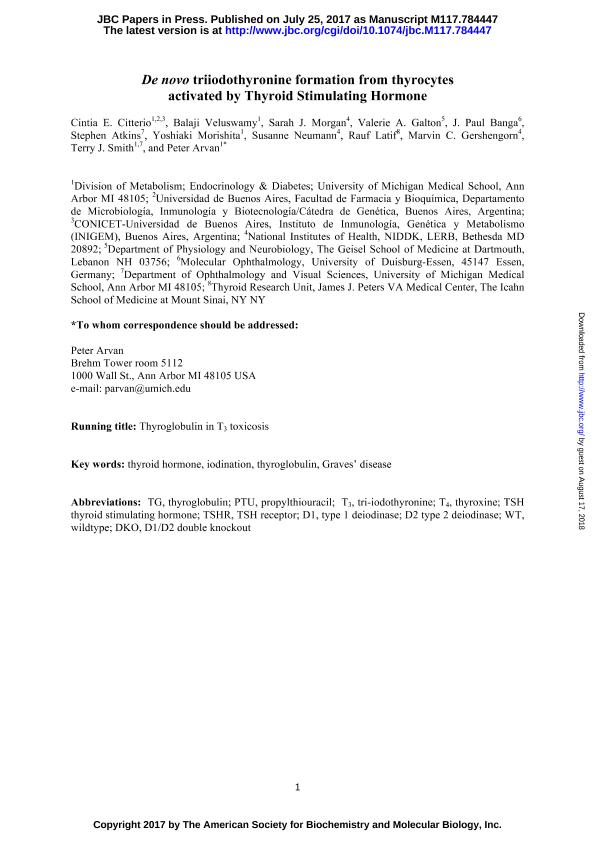Mostrar el registro sencillo del ítem
dc.contributor.author
Citterio, Cintia Eliana

dc.contributor.author
Veluswamy, Balaji
dc.contributor.author
Morgan, Sarah J.
dc.contributor.author
Galton, Valerie A.
dc.contributor.author
Banga, J. Paul
dc.contributor.author
Atkins, Stephen
dc.contributor.author
Morishita, Yoshiaki
dc.contributor.author
Neumann, Susanne
dc.contributor.author
Latif, Rauf

dc.contributor.author
Gershengorn, Marvin

dc.contributor.author
Smith, Terry J.
dc.contributor.author
Arvan, Peter
dc.date.available
2018-08-17T20:11:03Z
dc.date.issued
2017-07
dc.identifier.citation
Citterio, Cintia Eliana; Veluswamy, Balaji; Morgan, Sarah J.; Galton, Valerie A.; Banga, J. Paul; et al.; De novo triiodothyronine formation from thyrocytes activated by Thyroid-stimulating hormone; American Society for Biochemistry and Molecular Biology; Journal of Biological Chemistry (online); 292; 37; 7-2017; 15434-15444
dc.identifier.issn
0021-9258
dc.identifier.uri
http://hdl.handle.net/11336/56269
dc.description.abstract
The thyroid gland secretes primarily tetraiodothyronine (T4), and some triiodothyronine (T3). Under normal physiological circumstances, only one-fifth of circulating T3 is directly released by the thyroid, but in states of hyperactivation of thyroid-stimulating hormone receptors (TSHRs), patients develop a syndrome of relative T3 toxicosis. Thyroidal T4 production results from iodination of thyroglobulin (TG) at residues Tyr5 and Tyr130, whereas thyroidal T3 production may originate in several different ways. In this study, the data demonstrate that within the carboxyl-terminal portion of mouse TG, T3 is formed de novo independently of deiodination from T4. We found that upon iodination in vitro, de novo T3 formation in TG was decreased in mice lacking TSHRs. Conversely, de novo T3 that can be formed upon iodination of TG secreted from PCCL3 (rat thyrocyte) cells was augmented from cells previously exposed to increased TSH, a TSHR agonist, a cAMP analog, or a TSHR-stimulating antibody. We present data suggesting that TSH-stimulated TG phosphorylation contributes to enhanced de novo T3 formation. These effects were reversed within a few days after removal of the hyperstimulating conditions. Indeed, direct exposure of PCCL3 cells to human serum from two patients with Graves’ disease, but not control sera, led to secretion of TG with an increased intrinsic ability to form T3 upon in vitro iodination. Furthermore, TG secreted from human thyrocyte cultures hyperstimulated with TSH also showed an increased intrinsic ability to form T3. Our data support the hypothesis that TG processing in the secretory pathway of TSHR-hyperstimulated thyrocytes alters the structure of the iodination substrate in a way that enhances de novo T3 formation, contributing to the relative T3 toxicosis of Graves’ disease.
dc.format
application/pdf
dc.language.iso
eng
dc.publisher
American Society for Biochemistry and Molecular Biology

dc.rights
info:eu-repo/semantics/openAccess
dc.rights.uri
https://creativecommons.org/licenses/by-nc-sa/2.5/ar/
dc.subject
Thyroid Hormone
dc.subject
Iodination
dc.subject
Thyroglobulin
dc.subject
Graves' Disease
dc.subject
Protein Secretion
dc.subject
Protein Processing
dc.subject.classification
Inmunología

dc.subject.classification
Medicina Básica

dc.subject.classification
CIENCIAS MÉDICAS Y DE LA SALUD

dc.title
De novo triiodothyronine formation from thyrocytes activated by Thyroid-stimulating hormone
dc.type
info:eu-repo/semantics/article
dc.type
info:ar-repo/semantics/artículo
dc.type
info:eu-repo/semantics/publishedVersion
dc.date.updated
2018-06-05T20:14:16Z
dc.journal.volume
292
dc.journal.number
37
dc.journal.pagination
15434-15444
dc.journal.pais
Estados Unidos

dc.journal.ciudad
Bethesda
dc.description.fil
Fil: Citterio, Cintia Eliana. Consejo Nacional de Investigaciones Científicas y Técnicas. Oficina de Coordinación Administrativa Houssay. Instituto de Inmunología, Genética y Metabolismo. Universidad de Buenos Aires. Facultad de Medicina. Instituto de Inmunología, Genética y Metabolismo; Argentina. University of Michigan; Estados Unidos
dc.description.fil
Fil: Veluswamy, Balaji. University of Michigan; Estados Unidos
dc.description.fil
Fil: Morgan, Sarah J.. National Institutes of Health; Estados Unidos
dc.description.fil
Fil: Galton, Valerie A.. Geisel School of Medicine at Dartmouth; Estados Unidos
dc.description.fil
Fil: Banga, J. Paul. Universitat Essen; Alemania
dc.description.fil
Fil: Atkins, Stephen. University of Michigan; Estados Unidos
dc.description.fil
Fil: Morishita, Yoshiaki. University of Michigan; Estados Unidos
dc.description.fil
Fil: Neumann, Susanne. National Institutes of Health; Estados Unidos
dc.description.fil
Fil: Latif, Rauf. Icahn School of Medicine at Mount Sinai; Estados Unidos
dc.description.fil
Fil: Gershengorn, Marvin. National Institutes of Health; Estados Unidos
dc.description.fil
Fil: Smith, Terry J.. University of Michigan; Estados Unidos
dc.description.fil
Fil: Arvan, Peter. University of Michigan; Estados Unidos
dc.journal.title
Journal of Biological Chemistry (online)

dc.relation.alternativeid
info:eu-repo/semantics/altIdentifier/url/http://www.jbc.org/cgi/doi/10.1074/jbc.M117.784447
dc.relation.alternativeid
info:eu-repo/semantics/altIdentifier/doi/http://dx.doi.org/10.1074/jbc.M117.784447
Archivos asociados
